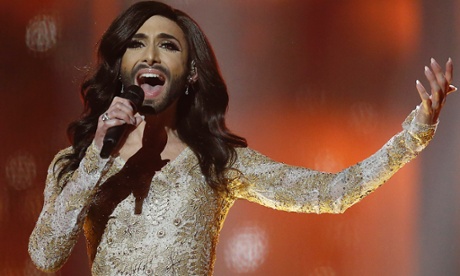
What do you get if you mix pop music, live television and international politics? Until Simon Cowell makes good on his threat to turn elections into X Factor-style reality shows – in which candidates are elected not on their policy positions but on their ability to belt out a tear-jerking rendition of Someone Like You – the answer is the Eurovision Song Contest, Europe’s biggest non-sporting televised event and an unmissable annual festival of glitzy costumes, petty rivalries and jaw-droppingly surreal stage performances. Oh, and a bit of music too.
To an outsider, Eurovision’s mix of Spanish power ballads, Montenegrin rap, Serbian turbo-folk and Romanian opera (to name just a few genres you may see in any given year) may seem inscrutable. But therein lies its curious genius. For almost 60 years, the contest has celebrated continental culture in all its glorious diversity, as well as proving a launchpad for talents as diverse as Abba, Celine Dion and Serge Gainsbourg.
If you are approaching the contest for the first time this year, here are the key points to consider.
Anything goes … as long as it’s over in less than three minutes
The rules of Eurovision are numerous and ever-shifting, but for over five decades, one fundamental principle has remained constant. Competing nations can be represented by a single song in any genre or style, so long as the run time of their entry doesn’t exceed three minutes. If you want to spend your time onstage screeching tunelessly about the nature of good and evil while dressed like a glitter-studded lion, you’re free to do so – but it’s instant disqualification if you’re not off that stage after 180 seconds.
Some countries take it more seriously than others
With an annual audience of well over 100 million viewers, Eurovision can provide an excellent launchpad for a music career, and the pop-loving people of Sweden understand this better than most. Every year the nation’s most popular singers battle tooth and nail in their hugely popular national selection, which is a multi-arena event in itself. This year’s representative Sanna Nielsen had to try seven times before the public deemed her suitably qualified to represent them. Latvia on the other hand, have sent a song about cake.
People have risked their lives to perform
While for many countries Eurovision is merely entertainment, for others it represents a rare opportunity to stand up and be counted on the world stage. During the brutal disintegration of Yugoslavia in the early 1990s, the newly independent states of Bosnia-Herzegovina and Croatia overcame enormous adversity to be included. In 1993, Bosnian singer Fazla escaped Serbian fire at the Sarajevo airport to get to the contest in Ireland. He came in 16th place.
Voting is complicated, political, slow – and brilliant
After all the songs have been performed, which can take hours, viewers are invited to vote for their favourite. In each country these votes are combined with the scores of a professional jury and the top ten songs are awarded points from 12 to 1. At present, between 37 and 43 countries participate in Eurovision each year, and each country’s points are delivered individually. This takes a very long time, and the live satellite link-ups to the national spokespeople are frequently riddled with bizarre mistranslations, shameless publicity stunts and embarrassing errors. Of course this is often more gripping than the preceding songs.
It's 'gay Christmas'
Although it was never conceived with an LGBT audience in mind, over the years the combination of catchy pop music and kitsch stage performances have made Eurovision a highlight of the gay calendar, and it is often affectionately referred to as "gay Christmas". Many notable LGBT performers have taken to the stage over the years, including Israel’s Dana International, Serbia’s Marija Šerifović and Ukrainian drag queen Verka Serduchka. This year, Austria will be represented by self-styled "bearded lady" Conchita Wurst, the alter ego of singer and performer Thomas Neuwirth. Conservative protestors in Russia circulated a petition for the singer’s removal, complaining that she risked turning the contest into "a hotbed of sodomy". Perish the thought.
It’s a fabulous excuse for a party
The key to Eurovision’s enduring appeal is the tradition of throwing an enormous celebration in its honour. Partygoers all over Europe don their best national costumes, load up on flags and continental nibbles and hold sweepstakes to keep everyone engaged during the lengthy voting process. Drinking games are often involved – popular ones include a shot for every ridiculous gimmick, unsubtle key change or your country scoring the maximum "douze points". Please drink responsibly.
How would you explain Eurovision to newcomers? Let us know in the comments below.

